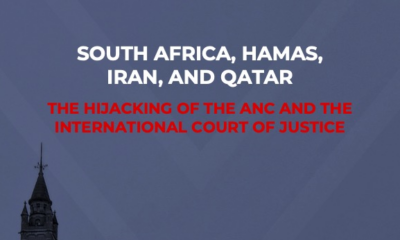
OpEds

ICJ genocide case – a slam dunk for Israel
“A tale … full of sound and fury, signifying nothing.” (William Shakespeare)
Even before South Africa’s lawyers took the podium at The Hague to argue that Israel was committing genocide in Gaza, it was clear that their case was a non-starter. Unsurprisingly, therefore, their oral submissions to the court provided a textbook illustration of the legal term “no case to answer”, denoting a situation where the charges made are so obviously without merit, they require no response.
If that wasn’t enough, by the end of the second day, once Israel’s lawyers had nonetheless responded, not only was South Africa’s case thoroughly demolished, but the tables had been turned – with South Africa now having to justify its own conduct in providing diplomatic cover to a patently genocidal terrorist organisation.
As an Israeli with South African roots, I confess to having initially viewed South Africa’s motives a lot more charitably than most of my compatriots and co-religionists. It was hard to contemplate a situation where one’s love for Israel and deep affection for South Africa could become incompatible. So, I rationalised that South Africa didn’t really believe its own genocide claim, but rather was using the only available legal avenue to exert pressure on Israel to stop its military operations out of a genuine concern for the casualties and suffering of ordinary people in Gaza. Though I’m convinced that a neutralised Hamas is the best outcome for Israelis and Palestinians alike, I identify with those who are deeply troubled by the terrible, if unavoidable, human cost of achieving that aim.
It was only a few seconds into the first speaker, Vusi Madonsela’s, address to the court, that I realised that my somewhat hopeful view of South Africa’s motives had been completely misplaced.
The South African case was a cut-and-paste regurgitation of the familiar anti-Israel, anti-Zionist narrative, taking aim at the very legitimacy of the state of Israel, going far beyond what was necessary for the proceedings before the court. As Madonsela rattled off slogan after anti-Zionist slogan – “nakba”, “colonisation”, “apartheid”, “forcibly dispossessed”, etc – it became all too apparent that South Africa was happy to be there as a proxy for those who deny Israel’s right to defend itself against the genocidal barbarism of Hamas and its ilk, let alone its right to exist.
As for South Africa’s attempt to prove “genocidal intent” on Israel’s part, this included the outrageous and unsubstantiated claim that Israel was deliberately killing civilians, especially children, while intentionally inflicting conditions of life calculated to bring about the physical destruction of Palestinians. What stood out in particular was the bizarre assertion that by urging and facilitating the evacuation of civilians from areas of intense combat – in fulfilment of Israel’s obligations under international humanitarian law – Israel was in fact displaying genocidal intent.
South Africa also accused Israel of starving the Gazan population while in fact Israel has shown its readiness to allow massive quantities of humanitarian aid into Gaza and has a designated unit, the Coordinator of Government Activities in the Territories (Cogat), working around the clock to make that happen. There are certainly substantial difficulties involved in distributing the aid within Gaza, such as Hamas hijacking convoys as well as logistical challenges, but to lay the blame on Israel and infer from that an existence of genocidal intent is ludicrous.
As for South Africa’s claim that Israel deliberately destroyed Gaza’s healthcare system, it conveniently overlooked the establishment of field and floating hospitals serving the areas to where civilians had been evacuated.
Perhaps the most outlandish accusation of the day was that Israel was engaged in “reproductive violence” by engineering difficulties of access to proper medical care and thereby deliberately preventing Palestinian births – further alleged proof of genocide. Seriously?
To be sure, there were aspects of South Africa’s arguments that were discomfiting for normative Israelis, namely the quotes from various public figures and soldiers which taken at face value, could be construed as justifying illegal conduct. However, anyone acquainted with Israel’s political set-up knows to dismiss this as bluster, having no bearing whatsoever on Israel’s actual official policy or conduct. This is an exasperating feature of a democratic open society – a high tolerance for people saying things that should not be said. South Africans will be struck by the hypocrisy of this argument, since South Africa has the same “problem”.
Much of South Africa’s effort was aimed at persuading the court that the legal threshold for determining whether there was a plausible case for genocide, thereby justifying urgent intervention by the court, was a very low one. The problem is that if you set the bar too low then almost any military action can be called a genocide, thereby emptying the term of its special meaning.
South Africa also wasted more than a few precious minutes waxing lyrical on how genocide was never justified – as if anyone thought it was. Interestingly, it all but neglected mentioning the crimes of Hamas and the suffering on the Israeli side – the massacre, the rapes, the torture, the kidnappings, the displacement, the indiscriminate rocket-fire, and the casualties of war. All this could have helped established a motive for Israel’s alleged crimes, but South Africa chose to leave it out. Apparently, this didn’t gel with the interests of the client.
Its time might have been better spent explaining to Israel and the world how the Israel Defense Forces should conduct its military campaign differently, given Hamas’s modus operandi of embedding its entire military-terror infrastructure in the civilian environment and conducting attacks from within, nearby, or under hospitals, schools, mosques, residential buildings, and United Nations facilities. Could it be that the South Africans thought, wisely, that any mention of this inconvenient truth might be prejudicial to their case?
The Israeli legal team was truly impressive. They did a superb job. But they didn’t need to. South Africa had no case to begin with.
Having said that, Israel finally had an opportunity to present its side of the story to the world before dozens of news outlets, without violent protests or rowdy hecklers. Most importantly, it showed that Israel is a country of laws, serious jurists, and a robustly independent legal system that ensures that the laws are followed, including on the battlefield. Thank you, South Africa, for supplying the platform.
Does all this mean the International Court of Justice (ICJ) will throw out the case? Of course not. One of the cases cited by Professor Vaughan Lowe for South Africa was a previous decision of the ICJ from 2004, “The Wall”, which ruled that Israel had no right to self-defence against Palestinian terror attacks. An astonishing decision to say the least. Ironically, as pointed out to the court by Tal Becker, legal adviser to Israel’s foreign ministry, the very same Lowe in a 2005 publication correctly stated:
“The source of the attack, whether a state or non-state actor, is irrelevant to the existence of the right” to defence. “Force may be used to avert a threat because no-one, and no state, is obliged by law passively to suffer the delivery of an attack.”
Can the ICJ, like Lowe, change its mind? Or its attitude towards Israel? For Israel’s sake and for the sake of international law, let’s hope so.
- David Benjamin is an Israeli attorney and international consultant specialising in international law, the law of armed conflict, and counter-terrorism. He’s a former career-officer in the Israel Defense Forces Military Advocate General’s Corps, where he served as chief legal adviser for the Gaza Strip and as director of the strategic and international branch in the international law department.











Andrew Penkin
January 19, 2024 at 4:15 am
שלום
Brilliant article! Thank you for this most interesting perspective & providing an excellent argument against anti-Israel/antisemic propoganda. I am a South African Jew. I feel embarrassed as a South African and afraid as Jew. It’s tough standing for the truth against a wave of ignorance, the m.media, indoctrination, deep hate & rage. Here in Cape Town we have a fairly substantial Muslim population. Jews & Muslims have generally got along well over many years. Now I have the dilemma of seeing that many of my Muslim associates, friends etc. are so vehemently pro-Palestinian / anti-Israel, which means they don’t condemn Hamas outright for its evil actions on Oct 7 (or they support Hamas). Now how do we stand with each other if we each support with all our hearts completely opposing views? You can’t talk or reason with these people if you support Israel. Many just hate you for that – full stop. Anyhow, we are concerned to say the least. I can’t help but think, would Israel be able to help us if things got really bad here, what with being under attack & stretched on all fronts & levels?
עם ישראל חי 🇮🇱
Jason McGrath
January 19, 2024 at 12:20 pm
Lies
Van Coppenhagen
January 19, 2024 at 12:58 pm
Absolutely informative/correct in every way & surely S.A. could/should have those expensive monies spent in our own country instead of making a laughing stock worldwide of us!!!
Errol Price
January 20, 2024 at 10:47 am
This is a very simplistic an unlawyerly article.
The ICJ does not function like a normal domestic court. Both sides select and present ” facts ” which suit their case. There is no oral evidence or cross-examination. And judges look to their government policies before deciding.
Israel’s case was undoubtedly weakened by utterly foolish statements coming from high government officials as well as the Prime Minister.
Yes, on balance Israel should prevail. But “slam dunk ;’ it certainly is not.